高一英语语法专题---句子成分分析和翻译练习(初高中衔接用)课件(共26张)
合集下载
初高中衔接 英语句子成分 课件(共36张PPT)

二、谓语 谓语在主语后,只能由动词充当
谓语是对主语动作的陈述和说明,一般在主语之后。表明主语“做
什么”、“是什么”、“怎么样”。有时态、语态的变化,与主语在人
称和数上保持一致。
He likes cold milk. He works hard.
简单谓语
I shall answer your questions after class.
we should do exercise every day.
名词短语 代词
动名词 不定式 宾语从句
四、表语 表语是说明主语「是什么」或「怎么样」的词语,也可以说是说 明主语的情况,或者主语状态的词语。 表语放在连系动词后。 Lily is a Chinese girl. 名词 Five and five is ten. 数词 Mr. Li is over there. 介词 The book is mine. 代词 She looks beautiful in white. 形容词 This is where I first met him. 从句
What is 连系动词? (1)be动词:am,is,are,was,were (2)感官动词:look,smell,sound,taste,feel (3)变化动词:become,get,go,grow,turn (+adj. 译为“变得”) (4)保持:keep,stay,remain (+adj. 译为“保持”) (5)无实义动词:seem,prove,appear (+adj. 无实际含义,功能类比be动词,译为“是”)
一、主语 主语是一个句子的主题,是句子表达的主体。表示句子所说是“什 么人”“什么事”是动作的发出者。 主语放在谓语动词前 American country music becomes more and more popular. 名词 We often speak English in class. 代词 One-third of the students in this class are girls. 数词 To swim in the river is a great pleasure. 不定式 Smoking does harm to the health. 动名词 When we are going to have an English test has not been decided.
初高中英语衔接-句子成分(共34张PPT)

work harder.
(目的状语)
He was so tired that he fell asleep immediately.
(
(结果状语)
She works very hard though she is old.
(让步状语)
• 同位语:同位语是在名词或代词之后并列名词 或代词,对前者加以说明的成分。如:
和一个谓语(或并列谓语)。 •
He often reads English in the morning.
Tom and Mike are American boys.
• She likes drawing and often draws pictures for the wall newspapers.
状语
1.用来修饰动词、形容词、副词或整个句子, 表示事情发生的时间、地点、原因、结果、 程度等等。
•
状语种类如下: How about meeting again at six?
(时间状语)
Last night she didn’t go to the dance party
because of the rain. (原因状语) I shall go there if it doesn’t rain.
注:主语和谓语是句子的主体部分(在英文中一般的句
子必须有主语和谓语)。
• 主语: subject S • 谓语:predicate V • 宾语: object O • 表语:predicative • 定语: attributive • 宾语补足语:object complement • 状语: adverbial
• 7. I think(that)he is fit for his office.
初高中衔接高一第一课 英语句子成分(共23张PPT)

I still remember the day when I first went to York.
将各组句子连接为一个含有状语从句的复合句。
He didn’t come yesterday. He was ill. (原因)
He didn’t come yesterday because he was ill.
复合句 = 主句 + 从句
复合句是在简单句的基础上,通过从属连词将两个或两个 以上简单句连接在一起而构成。从属连词所引导的从句起 形容词、名词、副词的作用。复合句主要包含以下从句类 型: 1. 名词性从句: 1)主语从句 2) 宾语从句 3) 表语从句 4)同位语从句 2. 形容词性从句 ( 定语从句) 3. 副词性从句 (状语从句 )
The child hid behind his mother's skirt, for he was afraid of the dog.
3. He made a promise. He didn’t keep it.
He made a promise, but He didn’t keep it.
主 谓 状(方式) 连 主 谓
表
Frank worked hard and (he ) became a manager.
主 谓 宾 连主 谓
地点
I’ve got a cold, so I’m going to bed.
主 谓 宾 宾补 连 主
谓
宾
They made him chairman, but (they) didn’t increase his salary.
简单句基本句型实例
主语 + 不及物动词 She came./ My head aches. 主语 + 及物动词 + 宾语
将各组句子连接为一个含有状语从句的复合句。
He didn’t come yesterday. He was ill. (原因)
He didn’t come yesterday because he was ill.
复合句 = 主句 + 从句
复合句是在简单句的基础上,通过从属连词将两个或两个 以上简单句连接在一起而构成。从属连词所引导的从句起 形容词、名词、副词的作用。复合句主要包含以下从句类 型: 1. 名词性从句: 1)主语从句 2) 宾语从句 3) 表语从句 4)同位语从句 2. 形容词性从句 ( 定语从句) 3. 副词性从句 (状语从句 )
The child hid behind his mother's skirt, for he was afraid of the dog.
3. He made a promise. He didn’t keep it.
He made a promise, but He didn’t keep it.
主 谓 状(方式) 连 主 谓
表
Frank worked hard and (he ) became a manager.
主 谓 宾 连主 谓
地点
I’ve got a cold, so I’m going to bed.
主 谓 宾 宾补 连 主
谓
宾
They made him chairman, but (they) didn’t increase his salary.
简单句基本句型实例
主语 + 不及物动词 She came./ My head aches. 主语 + 及物动词 + 宾语
英语句子成分分析--初高中英语衔接课 共27张ppt
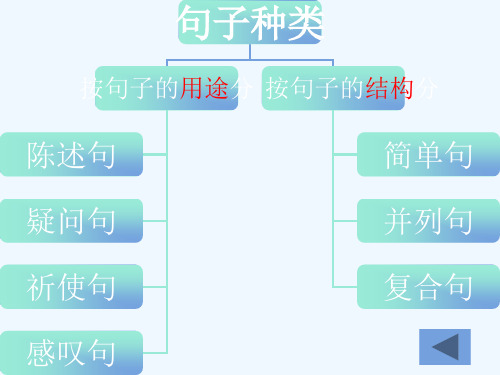
room.
基本句型五
S
V(及物) O (宾语) C(宾补)
We must keep the door open.
The makes me news
We call
him
happy. Jim.
He told
I
saw
me a thief
troom.
句子种类
按句子的用途分 按句子的结构分
陈述句
简单句
疑问句
并列句
祈使句
复合句
感叹句
句子成分 主语:行为主体,句子描述的主体 谓语: 主语发出的动作 宾语: 动作的承受者
表语:表示主语“是什么”“怎么样” 状语:时间、地点、原因等 定语:用来修饰名词、代词
句子成分
主语:You beat him. 谓语: You beat him. 宾语: You beat him. 表语:He is bad./He is a boy. 状语:You beat him at home. 定语:You beat the bad boy.
英语中那些成分可以充当宾语
❖1. We often help_h_im_ . 代词 ❖2. He likes to play__b_as_k_e_t_b_all.名词 ❖3. We enjoy_li_s_te_n_in_g__to__th_e__m_u_s_ic动. 名词 ❖4. She said _th_a_t_h_e_f_e_lt_s_i_ck.从句 ❖5. They are talking a_b_o_u_t_t_h_e_n_e_w_
你能归纳出定语的位置吗?
定语说明名词特点,性质; 状语则说明 动词何如何.
❖1. We _o_ft_e_n help him. ❖2. I r_e_a_ll_y don’t like the food. ❖3. He did his homework c_a_re_f_u_l_ly ❖a_t_h_o_m__e. ❖4.Her mother goes _o_u_t _to__d_o__s_o_m_e___
基本句型五
S
V(及物) O (宾语) C(宾补)
We must keep the door open.
The makes me news
We call
him
happy. Jim.
He told
I
saw
me a thief
troom.
句子种类
按句子的用途分 按句子的结构分
陈述句
简单句
疑问句
并列句
祈使句
复合句
感叹句
句子成分 主语:行为主体,句子描述的主体 谓语: 主语发出的动作 宾语: 动作的承受者
表语:表示主语“是什么”“怎么样” 状语:时间、地点、原因等 定语:用来修饰名词、代词
句子成分
主语:You beat him. 谓语: You beat him. 宾语: You beat him. 表语:He is bad./He is a boy. 状语:You beat him at home. 定语:You beat the bad boy.
英语中那些成分可以充当宾语
❖1. We often help_h_im_ . 代词 ❖2. He likes to play__b_as_k_e_t_b_all.名词 ❖3. We enjoy_li_s_te_n_in_g__to__th_e__m_u_s_ic动. 名词 ❖4. She said _th_a_t_h_e_f_e_lt_s_i_ck.从句 ❖5. They are talking a_b_o_u_t_t_h_e_n_e_w_
你能归纳出定语的位置吗?
定语说明名词特点,性质; 状语则说明 动词何如何.
❖1. We _o_ft_e_n help him. ❖2. I r_e_a_ll_y don’t like the food. ❖3. He did his homework c_a_re_f_u_l_ly ❖a_t_h_o_m__e. ❖4.Her mother goes _o_u_t _to__d_o__s_o_m_e___
句子成分分析课件-2023-2024学年高中英语初高中衔接

谓语 2 (用来说明主语“干什么”或者“怎么样”)
1.谓语,谓语动词,是句子最核 心、必不可少的成分。 2.只有动词、动词短语才可以充 当谓语。 3. 一般位于句中,主语之后。 4. 谓语动词有时态、情态、语态、 否定形式四种变化。 5. 有简单谓语He has caught a bad cold. 2. He cried. 3. I don’t like snakes. 4. I must learn English well. 5. The apple was eaten by me.
有些动词后可以跟双宾语(直接宾语、间接宾语) 句式:V.+sb.+sth.= V.+sth.+to+sb. (人间物直)
6 定语
修饰名词或者代词,说明人或者事物的品 质或者特征,有前置定语&后置定语。常 由名词、形容词、数词、介词短语、或相 当于形容词的词、短语或从句充当。
Examples: He is a clever boy.
宾语
1.宾语就是动作的对象,是行为或者动作的 承受者。 2.一般位于及物动词(谓语)或者介词之后。 3.名词、代词、数词、不定式、动名词、从 句均可做宾语。
5
5 Examples
1.Show you passport,please.(名词) 2.They won’t hurt us.(代词) 3.I want to leave now.(不定式) 5.I like staying with you. (动名词) 4.Can you pass me that English book? (名词短语)
1
英语中的句子成分
组成句子的各个部分叫做句子的成分
1.主语(Subject):动作的发出者 I eat apples. 2.谓语(Predicate):主语的动作或状态 I eat apples.
英语句子成分分析分析解析(课堂PPT)(2024版)

6. I prefer my coffee hot.
7. Don’t worry about me; just take care of yourself.
8. You can rely on him to do anything that is necessary.
与全句没有什 么语法关系, 有感叹词、肯 定与否定的答 语、插入语、 呼语等
常用词 例句 类
名词、 I find the book very boring. 形容词, 分词, 不定式 介词短 语等
名词、 This is Mr. Li, our 数词、 headmaster. 代词或 The news that he is ill 从句 worries us.
2024/11/13
14
主动语态变成被动语态后, 宾语补足语变成主补.
I last saw him playing near the river. →He was seen playing near the river. The teacher caught the student cheating →in the exam.
machine off. ● She wondered why Jim was so angry
with her.
2024/11/13
13
㈤宾语补足语
We must keep it a secret.
I found the book interesting.
Please keep the dog out.
The student was caught cheating in the exam.
We elected him monitor. →He was elected monitor.
高中英语句子成分分析课件(共19张)

He was advised to teach the lazy boy a lesson.形容词 The man over there is my old friend. 副词 The woman with a baby in her arms is my sister介. 词短语 The boys playing football are from Class 2.现在分词 The trees planted last year are growing well now.
练习:找出下列句中的谓语: We l_o__v_e_ China. We h__a__v_e___f_i_n__is__h__e_d__ reading this book. He c_a__n___s_p__e__a__k_ English. She _s_e__e_m___s__t__ir__e_d__.
3. 表语(predicative):
概念:
用在系动词后表示主语的性质、状态和特征。
如:
He is a teacher.
名词
Five and five is ten.
数词
He is asleep. 形容词
His father is in.
副词
The picture is on the wall. 介词短语
I enjoy working with you. 动名词
I hope to see you again. 不定式
Did you write down what he said? 宾语从句
练习:找出下列句子的宾语并指出由什么充当
We often help_h__i_m__.
代词
He likes _t_o__p__l_a__y__b__a__s_k__e_t__b_a__l_l_.
初高中英语衔接教学专题之英语句子成分和简单句的翻译课件 (共19张PPT)

Hearing the news, he jumped with joy. Whenever he gets drunk,John makes Mary very angry. As he was ill, he didn’t come to class yesterday.
翻入前页 跳入后页 返回目录页
2 谓语:说明主语做什么,是什么
或怎么样。谓语部分主要的词是动词。 谓语在人称和数方面必须和主语一致。
The sun rises in the east. He likes English. Her parents are workers. She is running.
2、分类
其中,主语、谓语(主要是动词)、宾语、宾语补足语及表语 称为句子的基本成分。
而定语及状语称为句子的附属成分。
翻入前页 跳入后页 返回目录页
Noun / Pronoun / The + adj V-ing / Clause / Infinitive Vi
宾语
noun 主 谓 宾语(间) 宾语(直) adj. / adv. Vt 语 语 infinitivபைடு நூலகம் 宾语 宾补 V-ing 表语 V-ed V-l etc. noun pronoun be / feel / seem / look adj appear /become /get Noun / Pronoun / grow / turn infinitive The + adj V-ing / V-ed go / come/ remain/ keep clause taste / smell etc. V-ing / Clause etc. 翻入前页 翻入前页 返回目录页 Infinitive
翻入前页 跳入后页 返回目录页
2 谓语:说明主语做什么,是什么
或怎么样。谓语部分主要的词是动词。 谓语在人称和数方面必须和主语一致。
The sun rises in the east. He likes English. Her parents are workers. She is running.
2、分类
其中,主语、谓语(主要是动词)、宾语、宾语补足语及表语 称为句子的基本成分。
而定语及状语称为句子的附属成分。
翻入前页 跳入后页 返回目录页
Noun / Pronoun / The + adj V-ing / Clause / Infinitive Vi
宾语
noun 主 谓 宾语(间) 宾语(直) adj. / adv. Vt 语 语 infinitivபைடு நூலகம் 宾语 宾补 V-ing 表语 V-ed V-l etc. noun pronoun be / feel / seem / look adj appear /become /get Noun / Pronoun / grow / turn infinitive The + adj V-ing / V-ed go / come/ remain/ keep clause taste / smell etc. V-ing / Clause etc. 翻入前页 翻入前页 返回目录页 Infinitive
初高衔接英语句子成分及基本句型(共26张PPT)

What happened?
He worked hard today.
Action speaks louder than words.
He can speak English well.
She doesn’t like dancing.
(三)表语(predicative)用来说明主语的性质、特征、状态、身 份等,位于系动词之后。一般由名词、代词、数词、形容词、 副词、不定
形容词
2. We try to make our country strong.
3. We found everything in good order there. 介词短语
4. I should advise you to get the chance. 5. I saw him going upstairs. 6. They found the house broken in.
补语 补足主语和宾语的意义
形容词,名词,介词 短语等
She always keeps the house clean.
主谓是基础,宾表定状补辅助。宾主来自名代数,动词作谓不可无!
(一)主语(subject)是一个句子所叙述的主体,一般位于句首。 表示句子说的是什么人或什么事。但在there be结构、疑问句(当主语不
是疑问词时)和倒装句中,主语位于谓语、助动词或情态动词后面。主语可由名 词、代词、数词、不定式、动名词、名词化的形容词和主语从句等表示。
Walls have ears.
名词
He will take you to the hospital. 代词
Three plus four equals seven. 数词
5.主+谓+宾+宾补 (S+ Vt+ O+ OC)
He worked hard today.
Action speaks louder than words.
He can speak English well.
She doesn’t like dancing.
(三)表语(predicative)用来说明主语的性质、特征、状态、身 份等,位于系动词之后。一般由名词、代词、数词、形容词、 副词、不定
形容词
2. We try to make our country strong.
3. We found everything in good order there. 介词短语
4. I should advise you to get the chance. 5. I saw him going upstairs. 6. They found the house broken in.
补语 补足主语和宾语的意义
形容词,名词,介词 短语等
She always keeps the house clean.
主谓是基础,宾表定状补辅助。宾主来自名代数,动词作谓不可无!
(一)主语(subject)是一个句子所叙述的主体,一般位于句首。 表示句子说的是什么人或什么事。但在there be结构、疑问句(当主语不
是疑问词时)和倒装句中,主语位于谓语、助动词或情态动词后面。主语可由名 词、代词、数词、不定式、动名词、名词化的形容词和主语从句等表示。
Walls have ears.
名词
He will take you to the hospital. 代词
Three plus four equals seven. 数词
5.主+谓+宾+宾补 (S+ Vt+ O+ OC)
2022年英语初升高之句子成分讲解课件(带练习)(共20张PPT)

● 3. Although there are already robots which can do this job, rats are better。
● 解析:第二个are为谓语,rats为主语,Although there are already robots which can do this job为 让步状语从句, which can do this job作为定语从句此时robots.
二、句子成分详解
● 主语(subject):句子中说明的人或事物,是谓语动词的发出者,多位于句首 ● 常用名词和代词充当。 ● eg, ● You are my sunshine. ● Doing exercise is beneficial to our body. ● What you said is true.
● 作为定语从句修饰possessions.
● 5. There they met people from other parts of the country, who had also volunteered to help.
● 解析:met为谓语,they为主语,people from other parts of the country为宾语, who had also volunteered to help作为定语从 句修饰people.
● 2. 谓语(predicate): 说明主语的动作、状态和特征。只能由动词或者动词短语充当。 eg,
● Some students work out that difficult problem. ● The girls are swimming in the pool now.
● 3. 表语(predicative): 系动词之后的成分,表示主语的性质、状态和特征。 ● 常用名词、形容词和短语充当。 ● 常见系动词: be, 感官动词sound(听), look(看), feel(摸),smell(闻), taste(尝
高一英语语法专题---句子成分分析和翻译练习(初高中衔接用)课件(共26张) - 副本

简单句的句型结构: 主 系 表 主 谓 主 谓 宾 主 谓 宾 宾补 主 谓 间宾 直宾
什么是主语?
主语的定义:句子要表达或者描述的对象,可 以是名词、代词、数词、动词不定式、动名词、 名词化的形容词、短语、句子等。 eg. He is my elder brother. The tree is very old. To Chinese, six is a pleasing number.
什么是宾语?
宾语的定义:动作的承受者。宾语可以由名词 或者名词性质的成分充当,英语中可以接宾语 的词有三种:动词、介词、表语形容词。只记 前两种就好,最后一个不考,没意义。 eg. Jim likes football very much. My grandfather bought me a dictionary. Girls call her Anne. Everyone finds it difficult to get along with the lady.
什么谓语?
谓语的定义:用来说明主语做了什么动作或者 处于什么状态。谓语通常是动词,并位于主语 之后。尤其要注意时态和人称的变化。 eg. Today, I have a lot of homework to do. He will not go to attend the meeting tomorrow. Does she work hard every day?
句子成分和翻译训练
英语的句子分类:简单句、并列句和复合句。 简单句,只有一个主语和一个谓语,或者并列 主语或者并列谓语构成的句子。 eg. Mr Green often watches movies. Lucy and Lily are twins. The dancer is from America and dances very well.
初高英语衔接-《英语句子成分及基本结构》PPT课件41张

同位语
同位语是在名词或代词之后并列名词或代词或名 词短语对前者加以说明的成分,近乎于后置定语 。如: We students should study hard. We all are students. Carol , an American teacher, will come to our school.
habit. • 6. We must study English very hard. • 7. Our country will become stronger. • 8. The train had left by 10 last night.
表语(predicative)
表语用以说明主语是什么或怎么样,它 一般位于系动词之后,构成主系表结构 ,说明主语的状况,性质,特征等。
宾语补足语
英语中有些句子只有宾语并不能表达完整 的意思,还必须在宾语的后面加上宾语补 足语才能表达完整的意思。我们把“宾语+ 宾语补足语”称为复合宾语。复合宾语表达 的意思相当于一个句子的意思。
1 We called him Dongming.(名词) 2 We saw him playing soccer. (现在分词) 3 We saw him play soccer. (省to不定式) 4 We found math difficult.(形容词) 5 Mom makes me study all day. (省to不定式)
找出句子中的宾语补足语
① She likes the children to read newspapers and books in the reading-room.
② He asked her to take the boy out of school. ③ She found it difficult to do the work. ④ They call me Lily sometimes. ⑤ I saw Mr. Wang get on the bus.
初高中英语衔接之句法1——句子成分和句子分类课件(共24张)

状语 1. 用来修饰动词、形容词和 副词等的,表示事情发生 的时间、地点、原因、结 果、程度等等
2. 修饰动词时,位置在该动 词前后均可;修饰形容词 或副词,要放在它们之前
★ He runs quickly. 他跑地很快。 ★ She is very beautiful. 她非常漂亮。 ★ I will go there tomorrow.
5
2、表示“感觉”的词,如look(看起来),feel (觉得,摸起来),smell(闻起来),sound (听起来),taste(尝起来)等, 例如: She looked tired.(她看一去很疲劳。) I feel ill.(我觉得不舒服。) Cotton feels soft.(棉花摸起来很软。) The story sounds interesting.(这个故事听起来 很有趣。) The flowers smell sweet.(这些花闻起来很香。) The coffee tastes good..。
12
二、句子的分类 (按用途划分): 陈述句、疑问句、祈使句和感叹句
(一)陈述句:用来陈述一件事情,说明一个事实,表述说话
人的看法、和态度的句子。常用结构:主语+谓语+其它。 句末通常是句号。
Eg. 1. Tom can speak good English. 汤姆英语说的很好。 2. He is a student. 他是一个学生。3. I like football. 我喜欢足球。 4. Tom gets up early every day. 汤姆每天都起得很早。
9
(一)句子成分的特点和功能
句子 成分 主语 谓语 宾语
表语
特点和功能
例句
★ They are students.
高一英语衔接教育--句子成分(共26张PPT)
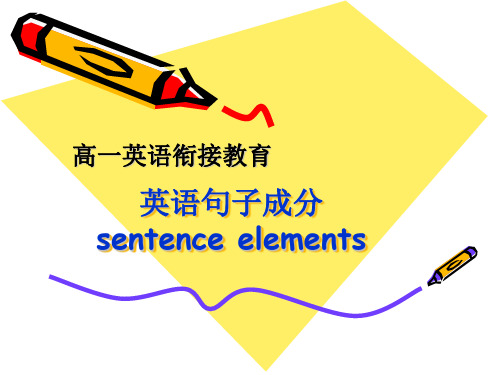
英语的句子中有些句子里只有宾语并不能表
达完整的意思,还必须在宾语后面加上宾语的补 足语才能表达完整的意思。我们把“宾语+宾语 补足语”合起来称为复合宾语。
复合宾语所表达的意思相当于一个句子的意 思。名词、动词、形容词、副词、介词短语、不 定式、现在分词、过去分词都可以作宾语补足语。
(六)句子中的定语:
We often speak English in class. (代词) One-third of the students in this class are girls. (数词) To swim in the river is a great pleasure. (不定式) Smoking does harm to the health. (动名词) The rich should help the poor. (名词化的形容词) When we are going to have an English test has not
(不定式短语)
We saw her entering the room. (现在分词) We found everything in the lab in good order.(介词短语) We will soon make our city what your city is now. (从句)
(2)复合宾语(宾语+宾补);
(五)英语句子中的宾语补足语:
观察下列句子,找出其宾语补足语,并分析归 纳其特点:
His father named him Dongming. (名词) They painted their boat white. (形容词) Let the fresh air in. (副词) You mustn’t force him to lend his money to you.
(新课标版)高一英语必修1【衔接篇 初高中衔接】第1课时 句子成分 课件(共22张PPT)
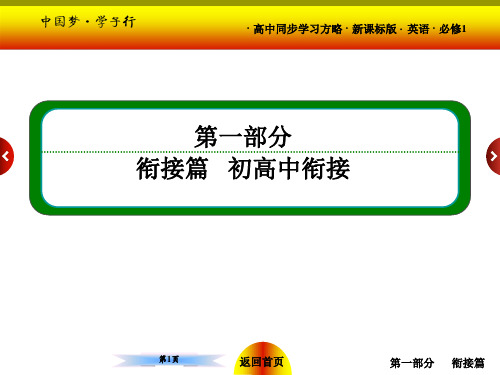
第19页
返回首页
第一部分 衔接篇
·高中同步学习方略 ·新课标版 ·英语 ·必修1
3.宾语补足语(Object Complement):英语中有些及物动词,除有一个直接 宾语以外,还要有一个宾语补足语,才能使句子的意义完整。带有宾语补足语的
一般句型为:某些及物动词(如make等)+宾语+宾补。宾补可由名词、形容词、 副词、不定式、分词或介词(短语)等充当。
第14页
返回首页
第一部分 衔接篇
·高中同步学习方略 ·新课标版 ·英语 ·必修1
5.I enjoy paint.________ 答案 paint→painting 6.The cake smells nicely.________ 答案 nicely→nice
第15页
返回首页
第一部分 衔接篇
·高中同步学习方略 ·新课标版 ·英语 ·必修1
They painted their boat white. 他们把船涂成白色。
Let the fresh air in. 让新鲜空气进来。
You mustn't force him to lend his money to you. 你绝不可强迫他借钱给你。
We saw her entering the room. 我们看见她进入了房间。
三、定语、状语、补语 考一考
指出下列句子中画线部分的句子成分 1.China is a ①developing country, while America is a ②developed country. 答案 ①定语 ②定语 2.He is reading an article about_how_to_learn_English. 答案 定语 3.The boy ①who_is_singing_there is ②her brother. 答案 ①定语 ②定语 4.Light travels most_quickly. 答案 状语
高中英语语法句子成分讲解(附练习和答案)课件(共22张PPT)

5种基本句型
主+谓 主+谓+直宾 主+谓+间宾+直宾 主+谓+直宾+宾补 主+谓(系)+表
1. Her love died. 2. She loved me. 3. She gave me a kiss. 4. She made me happy. 5. She is lovable.
动词决定句型,但动词决定不了状语和定语的存在与否,或者说,状语 和定语填补动词的语义空缺。
谓语 –说明主语的动作、状态和特征
✓ 必不可少; ✓ 决定句子结构; ✓ 谓语的形式结构-动词
– We study English. – He likes playing the games.
宾语 –动作的承受者
动宾 i like china. (名词) he hates you. (代词) how many do you need? we need two. (数词) we should help the old and the poor. i enjoy wor with you. (动名词) i hope to see you again. (不定式) did you write down what he said? (宾语从句) 介词后的名词、代词和动名词-----介宾 are you afraid of the snake? 双宾语-----间宾(指人)和直宾(指物) he gave me a book yesterday. give the poor man some money.
补语 – 补充说明名词的成分,通常出现在主语或宾语后边。
✓ 宾语补足语. ✓ 主语补足语(表语); ✓ 补足语的形式结构:
初高中英语衔接教学专题之英语句子成分分析ppt课件
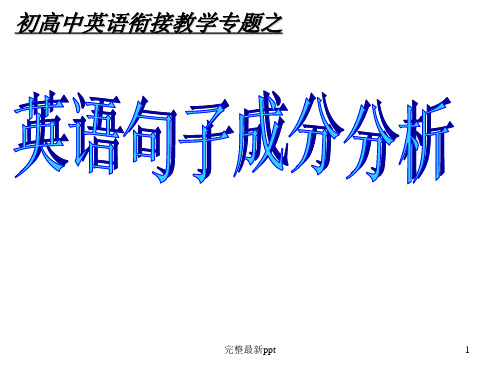
完整最新ppt
10
定语后置:
如果定语是由一个单词表示时,通常要前置。 而由一个词组或一个句子表示时,通常则后置
The girl in red is his sister. We have a lot of work to do. The girl standing under the tree is his daughter. Do you know the man who spoke just now?
• He got up so late that I missed the train.
• I waited to see you.
• He often went to ool by bus.
• His parents died, leaving him an orphan.
• Please call me if it is necessary.
完整最新ppt
7
• 宾语分为直接宾语和间接宾语.直接宾语指 物或事,间接宾语指人或动物.
• He gave me some books.
↓ 间接 宾语
↓ 直接 宾语
●please pass me the book. ●He bought his girlfriend some flowers.
完整最新ppt
初高中英语衔接教学专题之
完整最新ppt
1
1. I met my best friend Tom at the station yesterday.
↓↓ ↓
↓↓
↓
主谓 定 宾 同
状
语语 语 语 位
语
语
完整最新ppt
2
句子成分
定义 :构成句子的各个部分叫做句子成 分。句子成分有主要成分和次要成分; 主要成分:主语和谓语 次要成分:表语、宾语、定语、状语、 补足语、同位语
初高中衔接英语句子成分 PPT课件 图文
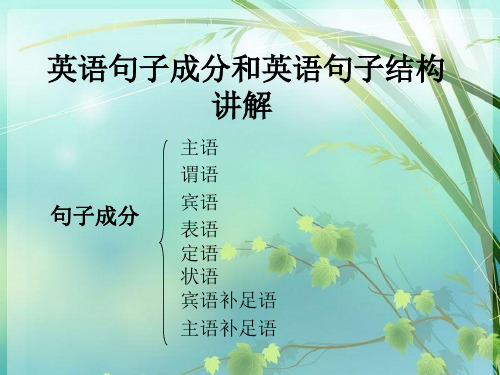
谢谢! 学妹给我打电话,说她又换工作了,这次是销售。电话里,她絮絮叨叨说着一年多来工作上的不如意,她说工作一点都不开心,找不到半点成就感。 末了,她问我:学姐,为什么想 找一份 自己热 爱的工 作这么 难呢? 我问她上一份工作干了多久,她 说不到 三个月 ,做的 还是行 政助理 的工作 ,工作 内容枯 燥乏味 不说, 还特别 容易得 罪人, 实在不 是自己 的理想 型。 我又问了她前几份工作辞职的原 因,结 果都是 大同小 异,不 是因为 工作乏 味,就 是同事 不好相 处,再 者就是 薪水太 低,发 展前景 堪忧。 粗略估计,这姑娘毕业不到一年 ,工作 却已经 换了四 五份, 还跨了 三个行 业。 但即使如此频繁的跳槽,她也仍 然没有 找不到 自己满 意的工 作。 2 我问她,心目中理想型的工作是 什么样 子的。 她说, 姐,你 知道苏 明玉吗 ?就是 《都挺 好》电 视剧里 的女老 大,我 就喜欢 她样子 的工作 ,有挑 战有成 就感, 有钱有 权,生 活自由 ,如果 给我那 样的工 作,我 会投入 我全部 的热情 。 听她说完,我尴尬的笑了笑。 其实每一个人都向往这样的成功 ,但这 姑娘却 本末倒 置了, 并不是 有了钱 有了权 有了成 就以后 才全力 以赴的 工作, 而是全 力以赴 工作, 投入了 自己的 全部以 后,才 有了地 位名望 钱财。 你要先投入,才会有收获,当你 真正投 入做一 件事后 ,会明 白两件 事:首 先你会 明白, 把一件 事认认 真真做 好,所 获得的 收益远 大于同 时做很 多事; 你会明白,有人风风火火做各种 事仍未 有回报 ,是因 为他们 从未投 入过。 从“做 了”到 “做” ,正如 “知道 ”到“ 懂得” 的距离 。 3 之前单位有一个姑娘,工作特别 拼命, 只要说 起她的 名字, 大家都 会赞不 绝口: 这姑娘 工作拼 命的程 度,连 男人们
相关主题
- 1、下载文档前请自行甄别文档内容的完整性,平台不提供额外的编辑、内容补充、找答案等附加服务。
- 2、"仅部分预览"的文档,不可在线预览部分如存在完整性等问题,可反馈申请退款(可完整预览的文档不适用该条件!)。
- 3、如文档侵犯您的权益,请联系客服反馈,我们会尽快为您处理(人工客服工作时间:9:00-18:30)。
• 29. The day when he helped me was one of my happiest.
• 30. You can't imagine how the name of Robben Island made us afraid.
• 31. We read books under our blanket.
• eg. Today, I have a lot of homework to do. • He will not go to attend the meeting
tomorrow. • Does she work hard every day?
什么是宾语?
• 宾语的定义:动作的承受者。宾语可以由 名词或者名词性质的成分充当,英语中可 以接宾语的词有三种:动词、介词、表语 形容词。只记前两种就好,最后一个不考, 没意义。
• 并列句即由并列连词(and、but、or等)连接 的两个或两个以上的简单句。
• eg. The direction is correct, but the road is full of difficulty.
• 复合句,又名主从复合句,即由一个主句 加上一个或者一个以上的从句构成的句子。
• If the weather is fine, we will go out for a walk.
• 21.Your friend has gone on holiday and asked you to take care of his dog.
• 22.I hear that you will travel along the Mekong River.
• 23. If the weather is fine, I think we will be able to ride 75km a day.
• 46. Edison is famous for his inventions in the world.
• 47. Perhaps, we can see some possibilities for next fifty years.
• 48. Winning this award made his chocolate very popular.
• 59. The kindness of a human heart is in a simple act.
• 24. Although it was autumn, the snow was already beginning to fall in Tibet.
• 25. To climb the mountain was hard work but as we looked around us, we were surprised by the view.
• We took a lot of pictures when we visited the famous palace.
• 简单句的句型结构: •主 系 表 •主 谓 •主 谓 宾 • 主 谓 的定义:句子要表达或者描述的对象, 可以是名词、代词、数词、动词不定式、 动名词、名词化的形容词、短语、句子等。
Beijing. • 14. He is to leave for shanghai tomorrow. • 15. He managed to finish the work in time. • 16. Tom came to ask me for advice. • 17. He found it important to master
• 35. Over a hundred people must have been driven away from their homes by the noise.
• 36. I have been offered a large sum of money to go away, but I am determined to stay here.
• 55. The electric vehicles can reach a top speed of 40 kilometers per hour.
• 56. What time a person goes to bed and how much they sleep affects how much they worry, according to a new study.
什么是表语?
• 表语的定义:放在系动词之后,用来说明 主语的性质、身份、特征或状态,即用来 说明主语是什么,为什么,怎么样。表语 用在系动词后面和系动词一起构成复合谓 语,即谓语部分。
• eg. I am fine. • This dish smells tasty. • Our teacher looks pretty in red.
• 37.They built the airport years ago, but for some reason they couldn't use it.
• 38. Tom will call his mother as soon as he gets to school.
• 39. Mike can sing as well as his brother.
• 49. Every year has been better than the year before; last year was the best by far.
• 50. We organize small group tours to get close to nature in Africa.
• 40. We should speak English as much as possible in order to be a good English learner.
• 41. When you get lost, you can ask the police for help.
• 42. The lady asked the policeman how to get to the Summer Palace.
• eg. Jim likes football very much. • My grandfather bought me a dictionary. • Girls call her Anne. • Everyone finds it difficult to get along
with the lady.
• 51. All delicious meals do not come from restaurants.
• 52. When foreigners first visit America, one of the first things many want to try is the country's typical snack food.
• 32. We used anything we could find to make candles.
• 33. We read books under our blanket and used anything we could find to make candles.
• 34.Sometimes I think this house will be knocked down by a passing plane.
• 43. My mother often tells me not to spend too much time playing computer games.
• 44. It’s no surprise that students are afraid of exams.
• 45. I am afraid to fail the exam. • 46. Tom is busy doing his homework.
sports shoes. • 5. He broke a piece of glass. • 6. He made it clear that he would leave the
city.
• 7. Trees turn green when spring comes. • 8. They pushed the door open. • 9. Grandpa told me an interesting story last
night. • 10. He wrote carefully some letters to his
friends. • 11. All the students think highly of his
teaching.
• 12. His job is to train swimmers. • 13. He took many photos of the palaces in
• 26. The man was sleeping downstairs when the earthquake happened.
• 27. The last thirty years have seen the greatest number of laws.
• 28. He offered poor black people guidance on their legal problems.
• eg. He is my elder brother. • The tree is very old. • To Chinese, six is a pleasing number.
什么是谓语?
• 谓语的定义:用来说明主语做了什么动作 或者处于什么状态。谓语通常是动词,并 位于主语之后。尤其要注意时态和人称的 变化。
• 30. You can't imagine how the name of Robben Island made us afraid.
• 31. We read books under our blanket.
• eg. Today, I have a lot of homework to do. • He will not go to attend the meeting
tomorrow. • Does she work hard every day?
什么是宾语?
• 宾语的定义:动作的承受者。宾语可以由 名词或者名词性质的成分充当,英语中可 以接宾语的词有三种:动词、介词、表语 形容词。只记前两种就好,最后一个不考, 没意义。
• 并列句即由并列连词(and、but、or等)连接 的两个或两个以上的简单句。
• eg. The direction is correct, but the road is full of difficulty.
• 复合句,又名主从复合句,即由一个主句 加上一个或者一个以上的从句构成的句子。
• If the weather is fine, we will go out for a walk.
• 21.Your friend has gone on holiday and asked you to take care of his dog.
• 22.I hear that you will travel along the Mekong River.
• 23. If the weather is fine, I think we will be able to ride 75km a day.
• 46. Edison is famous for his inventions in the world.
• 47. Perhaps, we can see some possibilities for next fifty years.
• 48. Winning this award made his chocolate very popular.
• 59. The kindness of a human heart is in a simple act.
• 24. Although it was autumn, the snow was already beginning to fall in Tibet.
• 25. To climb the mountain was hard work but as we looked around us, we were surprised by the view.
• We took a lot of pictures when we visited the famous palace.
• 简单句的句型结构: •主 系 表 •主 谓 •主 谓 宾 • 主 谓 的定义:句子要表达或者描述的对象, 可以是名词、代词、数词、动词不定式、 动名词、名词化的形容词、短语、句子等。
Beijing. • 14. He is to leave for shanghai tomorrow. • 15. He managed to finish the work in time. • 16. Tom came to ask me for advice. • 17. He found it important to master
• 35. Over a hundred people must have been driven away from their homes by the noise.
• 36. I have been offered a large sum of money to go away, but I am determined to stay here.
• 55. The electric vehicles can reach a top speed of 40 kilometers per hour.
• 56. What time a person goes to bed and how much they sleep affects how much they worry, according to a new study.
什么是表语?
• 表语的定义:放在系动词之后,用来说明 主语的性质、身份、特征或状态,即用来 说明主语是什么,为什么,怎么样。表语 用在系动词后面和系动词一起构成复合谓 语,即谓语部分。
• eg. I am fine. • This dish smells tasty. • Our teacher looks pretty in red.
• 37.They built the airport years ago, but for some reason they couldn't use it.
• 38. Tom will call his mother as soon as he gets to school.
• 39. Mike can sing as well as his brother.
• 49. Every year has been better than the year before; last year was the best by far.
• 50. We organize small group tours to get close to nature in Africa.
• 40. We should speak English as much as possible in order to be a good English learner.
• 41. When you get lost, you can ask the police for help.
• 42. The lady asked the policeman how to get to the Summer Palace.
• eg. Jim likes football very much. • My grandfather bought me a dictionary. • Girls call her Anne. • Everyone finds it difficult to get along
with the lady.
• 51. All delicious meals do not come from restaurants.
• 52. When foreigners first visit America, one of the first things many want to try is the country's typical snack food.
• 32. We used anything we could find to make candles.
• 33. We read books under our blanket and used anything we could find to make candles.
• 34.Sometimes I think this house will be knocked down by a passing plane.
• 43. My mother often tells me not to spend too much time playing computer games.
• 44. It’s no surprise that students are afraid of exams.
• 45. I am afraid to fail the exam. • 46. Tom is busy doing his homework.
sports shoes. • 5. He broke a piece of glass. • 6. He made it clear that he would leave the
city.
• 7. Trees turn green when spring comes. • 8. They pushed the door open. • 9. Grandpa told me an interesting story last
night. • 10. He wrote carefully some letters to his
friends. • 11. All the students think highly of his
teaching.
• 12. His job is to train swimmers. • 13. He took many photos of the palaces in
• 26. The man was sleeping downstairs when the earthquake happened.
• 27. The last thirty years have seen the greatest number of laws.
• 28. He offered poor black people guidance on their legal problems.
• eg. He is my elder brother. • The tree is very old. • To Chinese, six is a pleasing number.
什么是谓语?
• 谓语的定义:用来说明主语做了什么动作 或者处于什么状态。谓语通常是动词,并 位于主语之后。尤其要注意时态和人称的 变化。
